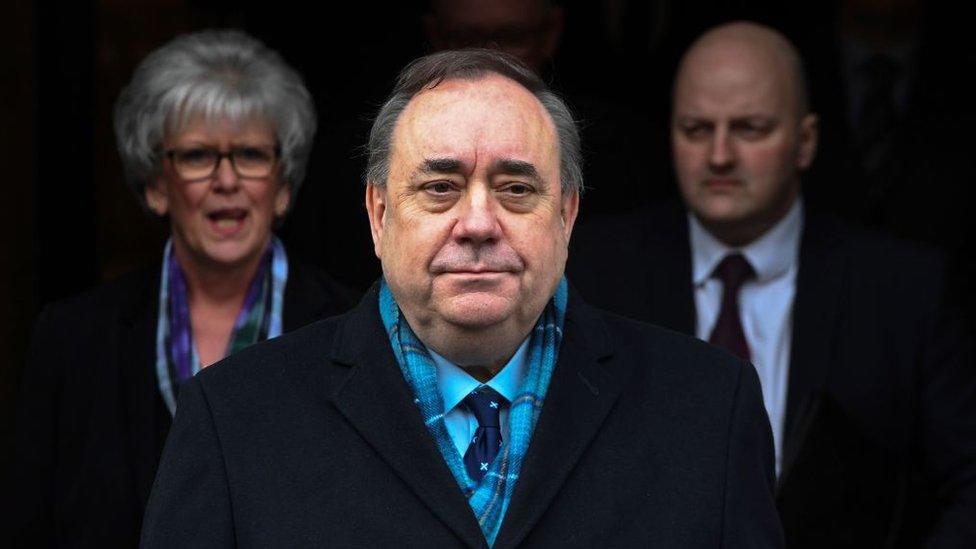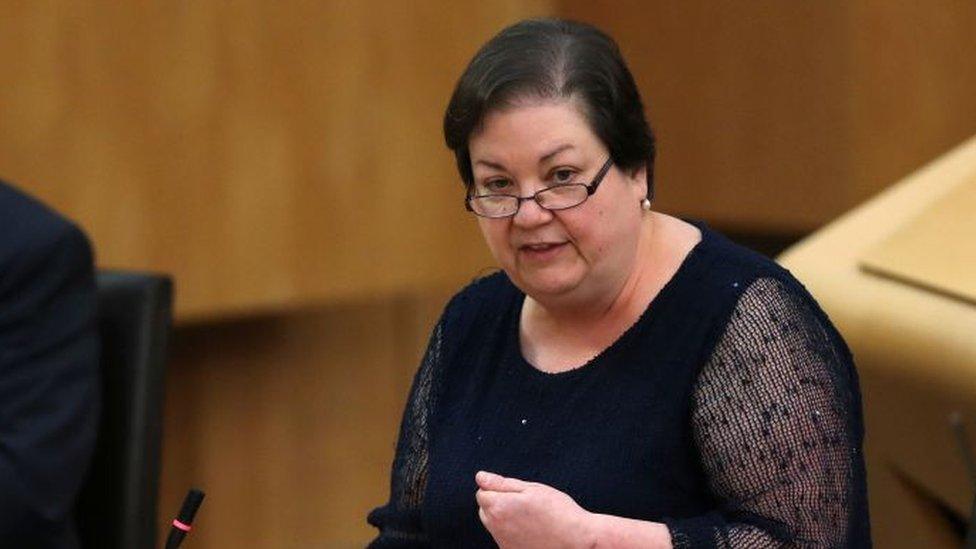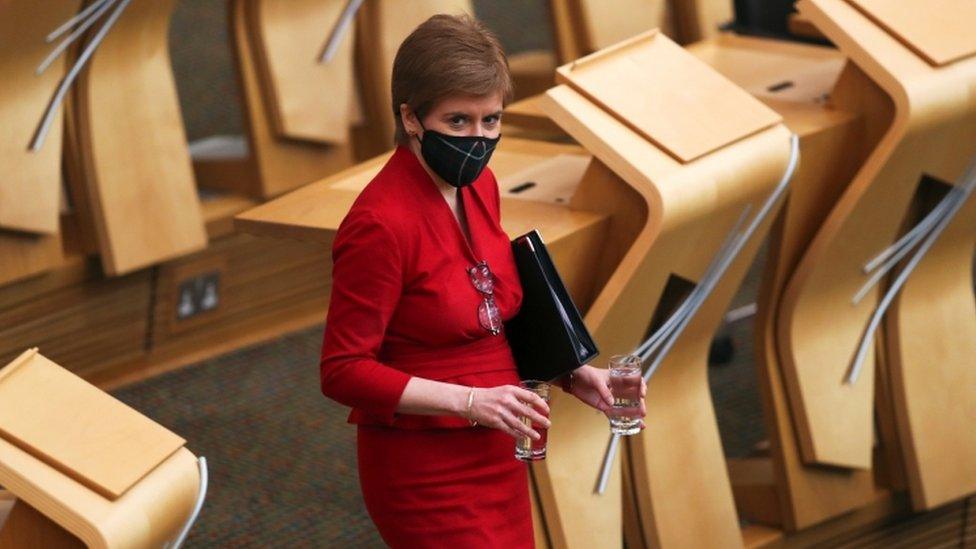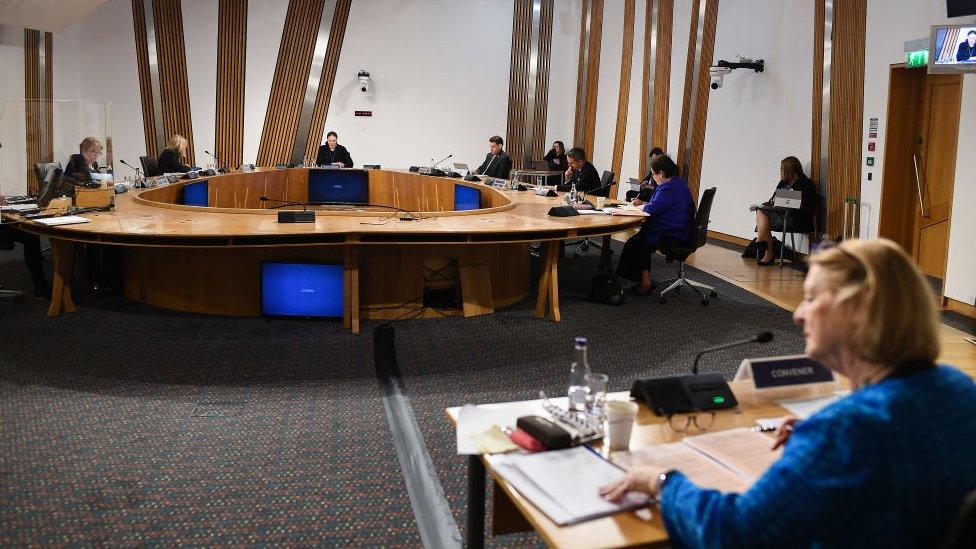Alex Salmond saga 'a crisis of credibility' for Holyrood
- Published

Mr Salmond has written to the Lord Advocate asking for an explanation for the Crown Office's actions
Holyrood faces a "crisis of credibility" over its inquiry into the handling of harassment complaints against Alex Salmond, opposition leaders have claimed.
The row centres on written evidence submitted to the inquiry by Mr Salmond that was later redacted at the request of the Crown Office.
The Crown Office has dismissed concerns the move was politically motivated.
Mr Salmond is now expected to give evidence to the inquiry on Friday.
In another development, MSPs on the inquiry committee have used their statutory powers to demand the release of more Crown Office documents.
They are asking the Crown Office to hand over all correspondence between Peter Murrell, chief executive officer of the SNP and Nicola Sturgeon's husband, Liz Lloyd, Nicola Sturgeon's chief of staff, Sue Ruddick, chief operating officer for the SNP and Ian McCann, SNP compliance officer.
Mr Salmond claims the documents being requested will show he was the victim of a high-level plot.
Ms Sturgeon, who has emphatically denied there was any such plotting against her former boss, is scheduled to appear before MSPs next week.
She described suggestions that the Crown Office's intervention was politically influenced as "downright wrong".
Committee evidence
Alex Salmond had been due to appear before the committee on Tuesday but pulled out when the parliament withdrew and then republished a redacted version of one of his submissions - after "grave concerns" were raised by the Crown Office.
Answering an urgent question in the Scottish Parliament on Wednesday afternoon, Lord Advocate James Wolffe QC said the decision to ask for the document to be amended was taken independently by "senior professional prosecutors".
And he said that government ministers had not sought to direct them.
He added: "The Crown has no interest in interfering with or limiting the conduct of proceedings in this parliament.
"Its only interest is securing compliance with an order of the High Court with which we are all obliged to comply."
The law officer was responding to a question by Scottish Labour interim leader Jackie Baillie, who said it was "simply unacceptable that the Lord Advocate refused to answer the questions put to him with any detail".
She added: "The fact of the matter is that the parliament is not getting straight answers from a Lord Advocate who appears to have viewed this afternoon's session in the chamber as a necessary chore and not a chance to engage with the Scottish Parliament in a spirit of democratic accountability."
Lord Advocate: "The decisions in relation to this matter were made by senior professional prosecutors acting independently."
Meanwhile, Mr Salmond said in a statement that his lawyers would be writing to the Lord Advocate to ask for an explanation for the Crown Office's "unprecedented and highly irregular actions".
Mr Salmond said he had also instructed his lawyers to request specifically that the Crown "preserve and retain all material and communications with all or any third parties which led to their decision to intervene at the very last minute" before he was due to appear before the inquiry.
His submission to the inquiry accuses First Minister Nicola Sturgeon of misleading parliament, and was posted on the parliament's website on Monday.
It was published after MSPs on Holyrood's corporate body decided after taking legal advice that it was possible to do so.
But the corporate body agreed on Tuesday morning to remove and revise the document after receiving a letter from the Crown Office which expressed "grave concerns".
The Crown Office later said it had taken action because of issues of potential contempt of court.

Labour's Jackie Baillie said the Lord Advocate had failed to answer her questions in any detail in the Holyrood chamber
The inquiry has been hit by severe delays since it started its work, with opposition MSPs accusing both the Scottish government and Mr Salmond of attempting to frustrate it and avoid scrutiny.
Speaking to the BBC's Good Morning Scotland programme earlier on Wednesday, Scottish Conservative leader Douglas Ross said "of course" parliament was facing a crisis of credibility over the inquiry.
He said: "This sleaze and scandal within the SNP has now undermined everything that's going on in Holyrood and the nationalists are clearly treating parliament and the Scottish people with contempt".
The Lord Advocate was appointed by First Minister Nicola Sturgeon and is both the head of the Crown Office and the Scottish government's chief legal adviser.
Separate documents submitted to the inquiry by Mr Salmond accuse the Crown Office of being unfit for purpose under its current leadership, and claim it is too close to both the Scottish government and the SNP.
Mr Salmond also alleged that there was "a deliberate, prolonged, malicious and concerted effort amongst a range of individuals within the Scottish government and the SNP to damage my reputation, even to the extent of having me imprisoned."

Nicola Sturgeon has dismissed claims that there was a conspiracy against Mr Salmond
Mr Ross claimed that the Lord Advocate being a member of the Scottish government meant there could be a possible conflict of interest in his involvement.
Ruth Davidson, the Scottish Conservative group leader at Holyrood, later told BBC Radio 4's World at One programme that she believed there should be an independent, judge-led inquiry into "why the government is not allowing a committee of its own parliament to have access to information they need".
She added: "At the moment the government is running riot and is denying the parliament its right of scrutiny."
Ms Sturgeon, who is currently due to give evidence to the inquiry next week, has denied there was a conspiracy against Mr Salmond, saying her predecessor had made claims "without a shred of evidence".
She has also denied that she breached the ministerial code or that her government has attempted to obstruct the inquiry, and has said that she is "relishing" the prospect of giving evidence in person.

The inquiry is due to report next month but has been hit by a series of delays
Speaking at her daily coronavirus briefing, she said: "Decisions the Crown Office takes in relation to enforcing or upholding the law are taken independently of government.
"Any suggestion at all that these decisions are in any way politically influenced is downright wrong".
Ms Sturgeon also said she did not believe the redaction of the document was a good reason for Mr Salmond to refuse to appear before the inquiry.
The inquiry committee has been examining what went wrong with the government's internal investigation into sexual harassment complaints against Mr Salmond that were made by two female civil servants.
The government had to pay legal expenses of more than £500,000 to Mr Salmond after it admitted it had acted unlawfully during the investigation.
Mr Salmond was later cleared of 13 charges of sexual assault against a total of nine women after a High Court trial last year.